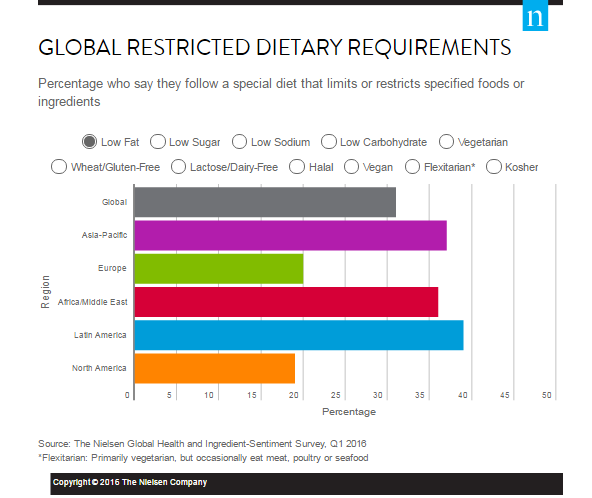 Gone are the days of being blissfully ignorant about what’s in the food we eat. In fact, consumers around the world are increasingly focused on clean eating and the benefits of eating more healthfully, with 70% of global respondents in Nielsen’s Global Health and Ingredient-Sentiment Survey saying they actively make dietary choices to help prevent health conditions such as obesity, diabetes, high cholesterol and hypertension.
Gone are the days of being blissfully ignorant about what’s in the food we eat. In fact, consumers around the world are increasingly focused on clean eating and the benefits of eating more healthfully, with 70% of global respondents in Nielsen’s Global Health and Ingredient-Sentiment Survey saying they actively make dietary choices to help prevent health conditions such as obesity, diabetes, high cholesterol and hypertension.
“Consumers want to eat more healthfully, but they can’t do it alone,” said Andrew Mandzy, Director of Strategic Health and Wellness Insights, Nielsen. “They need help from food manufacturers to offer products that are formulated with good-for-you ingredients. They need help from retailers to stock shelves with right-priced healthful assortment. And they need help from the medical community to provide proper guidance on what and how much to eat in order to maintain a healthy lifestyle.”
Helping consumers eat more healthfully may also drive healthier bottom lines for manufacturers and retailers. Two-thirds of global respondents (68%) strongly or somewhat agree they’re willing to pay more for foods and drinks that don’t contain undesirable ingredients. An analysis of U.S. retail sales data supports this notion: While total fast-moving consumer goods (FMCG) sales volume has been flat over the past four years, sales of products with health and wellness claims are outpacing total category growth by a significant margin in many categories.
Health concerns are contributing to the recent trend, as the percentage of respondents who self-report a food sensitivity or intolerance is noteworthy. Thirty-six percent of global respondents in Nielsen’s survey say they or someone in their household have an allergy or intolerance to one or more foods. Dairy or lactose and shellfish allergies are the most common self-reported food allergies or intolerances, each cited by 12% of global respondents.

Beyond allergies and intolerances, most of us are making an effort to exclude something from our diets. Regardless of the motivating factor, nearly two-thirds of global respondents (64%) say they follow a diet that limits or prohibits consumption of some foods or ingredients, and the rates are even higher in certain regions. More than eight in 10 African/Middle Eastern respondents (84%) say they follow a special diet that limits their consumption of selected foods, with halal the most commonly cited diet (48%). Respondents in Asia-Pacific are also more likely than the global average to say they follow a special diet (72%), and they’re most likely to say they adhere to a vegetarian diet (19% versus 14% globally). Half of North American respondents say they follow a special diet, followed by 44% of European respondents.
Globally, diets that limit the amount of fat or sugar are most common (31% and 26%). Additionally, about one in five respondents say they follow a diet that limits the consumption of sodium or carbohydrates (19% each).

Other findings from Nielsen’s Global Health and Ingredient-Sentiment Survey include:
75% of global respondents say they’re worried about the long-term impact of artificial ingredients.
Artificial flavors (62%), preservatives (62%) & colors (61%) are the most avoided food ingredients among global consumers.
Only 45% of respondents with special dietary requirements say that current offerings fully meet their needs.


